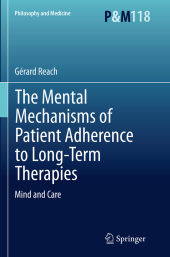 Neuerscheinungen 2016Stand: 2020-02-01 |
Schnellsuche
ISBN/Stichwort/Autor
|
Herderstraße 10
10625 Berlin
Tel.: 030 315 714 16
Fax 030 315 714 14
info@buchspektrum.de |

Gérard Reach
The Mental Mechanisms of Patient Adherence to Long-Term Therapies
Mind and Care
Softcover reprint of the original 1st ed. 2015. 2016. xxi, 207 S. 23 SW-Abb. 235 mm
Verlag/Jahr: SPRINGER, BERLIN; SPRINGER INTERNATIONAL PUBLISHING 2016
ISBN: 3-319-38541-0 (3319385410)
Neue ISBN: 978-3-319-38541-9 (9783319385419)
Preis und Lieferzeit: Bitte klicken
How can we accept that we ought to stop smoking, follow a diet, exercise, or take medications? The goal of this book is to describe the mechanisms of patients´ adherence to long-term therapies, whose improvement, according to the World Health Organization (WHO), would be more beneficial than any biomedical progress. For example, approximately half of the patients do not regularly follow medical prescriptions, resulting in deleterious effects on people´s health and a strong impact on health expenditure. This book describes how our beliefs, desires, and emotions intervene in our choices concerning our health, by referring to concepts developed within the framework of the philosophy of mind. In particular, it tries to explain how we can choose between an immediate pleasure and a remote reward-preserving our health and our life. We postulate that such an "intertemporal" choice can be directed by a "principle of foresight" which leads us to give priority to the future. Just like patients´ non-adherence to prescribed medications, doctors often don´t always do what they should: They are non-adherent to good practice guidelines. We propose that what was recently de-scribed as "clinical inertia" could also represent a case of myopia: From time to time doctors fail to consider the long-term interests of their patient. Both patients´ non-adherence and doctors´ clinical inertia represent major barriers to the efficiency of care. However, it is also necessary to respect patients´ autonomy. The analysis of relationship between mind and care which is provided in this book sheds new light on the nature of the therapeutic alliance between doctor and patient, solving the dilemma between the ethical principles of beneficence and autonomy.
1 Introduction: The doctor, her patient, and their reasons.- 1. Adherence and nonadherence to therapies: A definition ; 2. Nonadherence: How frequent is it? ; 3. The consequences of nonadherence; 4. Scope of the book; 5. Some simple explanations for nonadherence; 6. A typology of adherence? Analogous or homologous phenomena; 7. The real question; 8. From behavior to action; 9. A philosophical interpretation of adherence to long-term therapies.- 2 The classic view ;1. Determinants of nonadherence to long-term therapies; 2. Behavioral models of patient adherence; 3. Limitations of psychological models; 4. A new perspective; 5. Psychology and philosophy, in search of mental mechanisms; 6. Observation and explanation; 7. Patient and agent.- 3 Intentionality ; 1. What is ´in your head´; 2. A mental puzzle and its formation; 3. Actions: A causal theory.- 4 An intentionalist model of adherence ; 1. Therapeutic agency; 2. An intentionalist model of adherence; 3. The pivotal role of emotions in patient adherence; 4. Bringing action into play: Volition.- 5 The dynamics of intentionality 1. Motivational force; 2. Self-control; 3. The force of habit; 4. Intention, decision, and willpower; 5. The dynamics of intentionality.- 6 Medical irrationality ; 1. Akrasia; 2. Patient nonadherence as a case of akrasia; 3. Another example of irrationality: The denial of illness; 4. Logical mechanisms of irrationality.- 7 Time and adherence: A principle of foresight ; 1. The effect of time; 2. The principle of foresight; 3. The appearance of adherence; 4. A physiopathological point of view; 5. A top-down model of adherence.- 8 An intentionalist account of doctor-patient relationship and biomedical ethics; 1. Philosophical analysis of doctor-patient relationship; 2. The principle of charity; 3. Adherence and autonomy.- 9 Doctors´ clinical inertia as myopia ; 1. Clinical inertia: Definition and logical description 2. Empirical evidence: The paradigm case of psychological insulin resistance; 3. Empathy and sympathy 4. The paradox of empathy in medical care; 5. Another conception of sympathy; 6. Care, sympathy,; beneficence, and love; 7. Care as a special form of sympathy; 8. The respective values of immediacy and future; 9. Empathy, sympathy, and the ethical dynamics of the pa-tient-doctor relationship; 10. A model of chronic care involving patient education and trust; 11. Conclusion: Mind and Care.- 10 Conclusion: Adherence Generalized ; 1. A choice between two actions; 2. Generalization of the problem; 3. Defining adherence by its explanation; 4. Eros and Thanatos.


